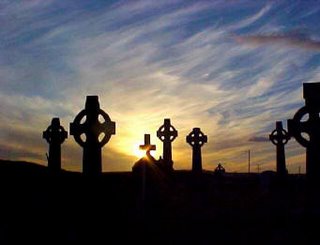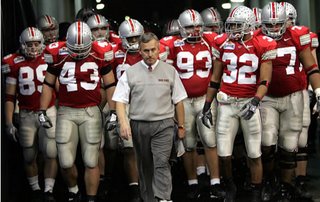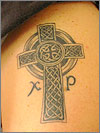

I think this was done in 2003 or 2004, but Jim Henderson from Off the Map interviewed Kevin Rains and myself about our experimentation in building relational networks with like-minded Kingdom folk and this is the transcript. I still find myself closely akin to these thoughts.
Missional Communities--Join the Fight Club!Kevin Rains and Chris Marshall lead missional communities in Cincinnati. They've been brought together by a mutual interest and a need for support. They've invited several other missional leaders from the region to join with them in something they're calling The Fight Club. Kevin and Chris recently sat down (at their computers) with Off The Map to fill us in on their view of the missional community movement. How did you guys meet? And why, since you live in the same city, did you not meet sooner?Kevin: I met Chris because a guy from New Zealand mentioned him on his website. So essentially we lived for years in the same city, share a near identical vision for church and ministry, but met because a guy seven thousand miles away wrote a couple sentences about this experiment in Cincinnati called "Ordinary Community." We probably didn't meet any sooner because we're more interested in flying under the radar and stirring up trouble quietly and in hidden ways... guerilla church! I guess if we were good at marketing and promotion we would be running a big business or a big church.
Chris: I actually knew of Kevin's group of communities but had never taken the time to make the connection (choosing instead in my youth to believe that I had an original idea). When Kevin contacted me, we got together at Starbucks. He asked me straight up what my intentions were. I told him that I wanted to live in Cincinnati for the rest of my life and ask God for his Kingdom to come. It rang true with his intentions. That was the beginning of a brotherhood.
What's your church background. Which groups/denominations have you been a part of?Kevin: I was baptized Episcopalian as a baby, grew up Baptist, spent a couple years in an independent Reformed church in high school, and eventually migrated toward the Vineyard via YWAM during my college days. All my current heroes are Roman Catholic. I'm a spiritual mutt.
Chris: I'm from a broken family. We attended my Mom's fundamental Baptist Church three times a month, and my Dad's basement Pentecostal Church once a month. I grew up either spiritually confused or angry, depended on the day. I got suspended from Catholic school five times, got married and ordained in an independent Bible Church, attended Evangelical Free college, served as youth pastor in the Disciples of Christ and Reformed Churches, interned at the Cincinnati Vineyard and went to a United Methodist Seminary. Yup, I'm a mutt too.
What's been happening in the Midwest in relationship to the missional community movement?Kevin: I recently heard Bono, the lead singer in the band U2, speak in Indianapolis and he said something to the effect of "One could easily grow a movement in the fertile soil of the Mid-west." That resonated with me and confirmed what I have felt since I was a kid. I grew up in Cincinnati and have dreamed since high school of a disciple-making, church planting movement in my hometown and this whole region. What started happening a few years ago is that several like-minded young dreamers started finding each other (mostly via the internet) and began relating. There's this informal web of relationships that exists from Cincy to Lexington to Columbus to Indianapolis to Dayton.
Chris: We're also finding that there are people who are dreaming up their own dreams in their own neighborhoods in every part of the country. Some of them are coming this summer just to hang with us a bit and see what we do (it’s pretty ordinary), but any excuse to throw a party and we're all for it. Hospitality is one of the key spiritual gifts to this gig and so having others come and receive hospitality from us is a great way to catch the missional community focus. We also are hosting our 3rd worship gathering this Easter which will consist of four different missional community networks. Quarterly gatherings say we're not alone.
Let's keep it real. When it comes to being edgy, Cincinnati isn't the first city that comes to mind. How did that happen?Kevin: Cincinnati rocks! We just don't want everybody moving here so we keep it kind of quiet. It's truly an amazing city, but I can't tell you why in this public forum or there might be a mass movement here and we'll lose that small town mixed with big city flair we have. Oops. I may have just told you part of the secret. The rest will require a decoder ring.
Chris: We say that Cincy is like Nazareth: "Can anything good come out of Cincinnati?" God's got a sense of humor.
What's the reason you guys gathered a bunch of like-minded missional community types?Kevin: We're desperate. Pioneering is lonely, slow, and hard. It helps to have a few other people who really get it to speak into your life.
Chris: Tying our boats together give us a broader view of the murky waters known as the future. More personally, when I hit the wall, these guys cared for me. Brotherhood is irreplaceable; life's too short to be isolated.
Why the name?Kevin: Actually it's just a nickname. On the way to the first meeting I was strongly impressed to not name it and not try to make it anything. Just build a few friendships and let Jesus do what he wants with it. So we decided to not name it. Perhaps a name will emerge. Chris can tell you how we got the nickname -- he said it first.
Chris: Brad Pitt is cool. Actually in the movie "fight club" these underground pseudo communities pop up out of a desperate attempt to find something "real." They attend neighborhood support groups because "it's cheaper than a movie and there's free coffee." I suppose this is ordinary enough for us to shoot for.
What are you hoping to accomplish through Fight Club?Kevin: To support, mutually equip, resource, love, and network a few guys that dream similar dreams... that are interested in being a part of a movement that Jesus leads and they facilitate... and to pick a few fights along the way.
Chris: What he said. For the first time in my ministry life I am doing something I believe in. I'm no longer turning the crank and running the machine; I wear my passion on my sleeve daily. I want to network with doers who feel the same way. If you're interested in waxing eloquently about postmodernism and deconstructing Church but you're not attempting anything in the real world, you're not invited. Fight Club is for doers who take risks, partner with God for the future and put feet on their dreams.
From your perspective, what is a missional community? What sets it apart from say a traditional church?Kevin: They tend to be smaller by design. They are more like AA or Fight Clubs than institutions. They talk more about reproduction than growth, relationships more than meetings. They are poorer. They rarely have buildings and don't dream of getting one and when they do get one they're not really sure what to do with it. They have no super stars. They read Nouwen more than Warren, and Church history more than Barna, but they love the whole church and are not angry or reactive against the traditionalistss or the mega-church guys. They just dream something different. Basically we want to be part of a kingdom movement, we're not about building an empire.
Chris: We count differently. We count relationships as our main event. We have to lower the bar of performance; excellence is not in our vocabulary. If it's not doable, we can't do it. Eighty to ninety per cent of our giving can go back out in mission; it isn't used to keep the organization running. The gift of teaching is not as crucial as the gift of hospitality. The priesthood of all believers is not an idealistic theology, it's necessary for survival. There aren't any power seats, nobody's getting paid. The focus can remain on authentic community and relational mission. Missional Communities are a way to do church in the new world that happens to fit our gift mix and passion areas.
What is it about this movement that you enjoy most? What worries you most?Kevin: I sometimes feel like I'm carrying around this secret in my pocket. Sometimes I take it out and look at it and feel like giggling. Other times I pull it out and it scares me like maybe it's not all it's cracked up to be.
Mostly I love the room to create and experiment and try things and fail and nobody in the big world of evangelicalism really cares all that much. I guess I love feeling like a scientist who is banking his whole life on an idea or a designer fooling around with prototypes all the while putting the idea/prototype through the most rigorous tests and refining it, reworking it, rethinking it... at times nearly starting over. But there's that sense of possible discovery, of finding something that actually works and ends up being helpful, a blessing to lots of people. That's what I enjoy... the experimentation for a purpose.
What worries me is that we'll succeed at being "communities" but fail at being "missional." I think the community part is happening pretty naturally. The missional part still needs a lot of work. At least with the communities I'm a part of and most of the ones I know of. I'm hopeful though... we have time. We'll figure it out. We have incredible resources like the Spirit of Christ, models from church history like the Celtic missionary monastics, some good mentors are emerging like Todd Hunter, Brian McLaren and the wonderful Jim Henderson.... and time is on our side. Most of the folks I'm tracking with are in their twenties and thirties.
Chris: This fits my two passions, relationships and evangelism. Being in this fulfills a sense of destiny for me. I enjoy the fact that its authentic and creative, not words I associated with Church growing up. It lowers the bar so everybody can play. Celebrities have to get over it.
For the first time in my life, I'm doing ministry and feel comfortable in my own skin at the same time. What worries me? At times, its really @#$% hard. It's painful, it's vulnerable, it goes hand in hand with suffering. Not everyone is wired for painting outside the lines. People will leave and go back to "big" church and you take it personally. Friends and family may never understand you. It will stretch you during this transition time in culture because it only exists on the margins of evangelicalism. When it is mentioned, it's seen as a church growth strategy (Big Mistake!).
Community is not a means (strategy) to and end (church growth). It's an end in and of itself (Kingdom of God expressed in the now). The worry is half of the exhilaration!







 Chad & T.J.
Chad & T.J.













